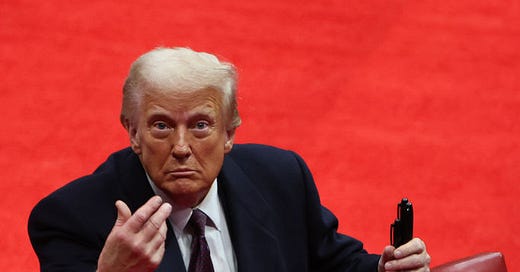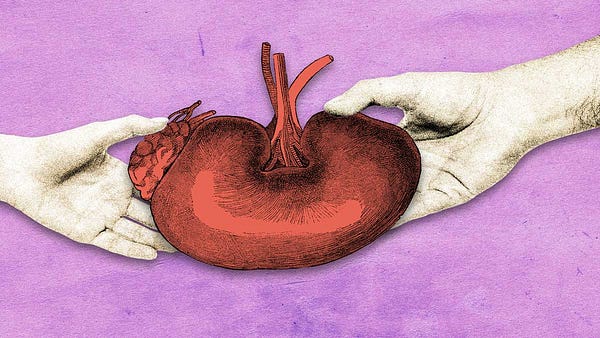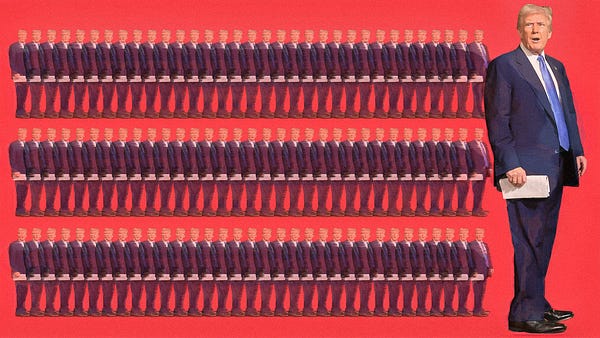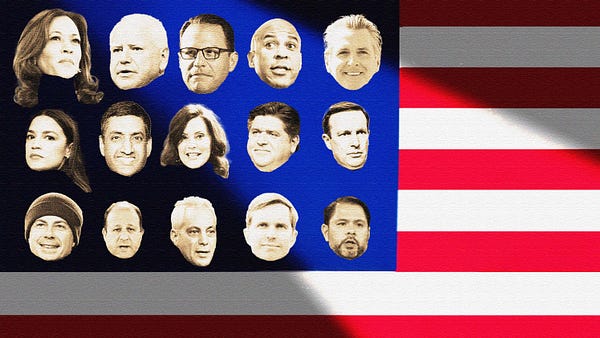
The Free Press

Can you remember the name of the man who nearly killed Donald Trump?
What about the guy who shot Reagan? Or the man who killed JFK?
John Hinckley Jr. and Lee Harvey Oswald are infamous. But despite having seen or heard it dozens of times over the past two weeks, I just had to look up the name of Thomas Matthew Crooks.
I suspect I’m not alone: few people seem to have committed Crooks’s name to memory, and even more will have forgotten it by the time the election rolls around. There are a variety of reasons for this, chief among them that the incident follows the inverse of the formula that makes an assassination famous. Unlike JFK, Trump survived the attempt on his life; unlike John Hinkley Jr., Crooks was shot dead within seconds. There will be no state funeral—and also no trial.
Instead, the only person held accountable thus far has been Secret Service director Kimberly A. Cheatle, who resigned Tuesday after a disastrous congressional hearing in which she admitted that the incident was one of the most catastrophic failures in her agency’s history. And rather than a story about the lone gunman who nearly made a martyr of the former president, the assassination attempt has become the tale of a fumbling bureaucrat whose inept leadership came with a body count.
Meanwhile, Crooks has faded from view, not just because he’s dead, but because he makes for a poor villain in this national drama. The last ten days of reporting have yielded nothing except more questions; the shooter remains a cipher with no clear motive nor ideology. There was no shout of ”Sic semper tyrannis” as he let the bullets fly, no manifesto left behind on a hard drive, not even a discernible affiliation with this or that political tribe. The Wall Street Journal reported that Crooks “appeared to care more about the act itself than about the target,” noting that he had searched for information about upcoming appearances by both Trump and President Biden before attempting to kill the former.
Indeed, it seems like the most political thing about this act of violence is not the motivations behind it, but everyone else’s response to it. Googling Crooks’s name returns, among other results, a Yahoo News headline that reads “Registered Republican and Gun Lover Who Shot Trump,” which conjures the image of an editor somewhere putting an extra-large thumb on the scale: This guy was one of yours, not one of ours. Yesterday, Representative Jerry Nadler (D-NY) said: “If you think this one assassin’s bullet was a bolt out of the blue, and not part of a wave of violence that has threatened the nation for years, then you have missed the point of what my Democratic colleagues and I have been imploring you to hear for some time.”
Meanwhile, in the wake of the shooting, Republicans made equally energetic attempts to blame left-wing rhetoric for inspiring the assassination attempt. You've spent the past eight years telling the world that Trump is literally Hitler; what did you think would happen? “Today is not just some isolated incident. The central premise of the Biden campaign is that President Donald Trump is an authoritarian fascist who must be stopped at all costs. That rhetoric led directly to President Trump’s attempted assassination,” wrote J.D. Vance in the wake of the shooting.
If the spectacle of Republicans leaping to politicize the shooting is distasteful, it is also understandable, after nearly a decade of being treated as guilty by association for various acts of violence—including ones that exist purely in the imaginations of their political opponents. There’s an entire category of progressive journalism predicated on the fantasy that every white American male under the age of 30 is a Manchurian candidate for the radical right, just awaiting his trigger phrase. In 2019, there was the moral panic surrounding Joker, which critics fretted would give a free pass to incels to commit wanton acts of violence. At the same time, outlets including The New York Times were warning their readers to closely monitor the YouTube habits of their teenage sons, lest they be seduced by the siren song of white supremacy buried within the algorithm.
And in 2022, when a psychotic man attacked the husband of House Speaker Nancy Pelosi at their home in California, many of my fellow liberals insisted that Republican rhetoric was to blame—and that to even mention the attacker's obvious mental illness as a mitigating factor was to be an apologist for the wrong side.
The aforementioned events reflect a widespread, bipartisan conviction that acts of violence are not merely the responsibility of those who perpetrate them. Someone like Thomas Matthew Crooks is just an exploding powder keg; the real culpability lies with whoever uttered the words that lit his fuse.
I understand the appeal of this mindset, which suggests not only that acts of violence are within our capability to prevent, but that the way to prevent them, conveniently, is to silence a group of people whose voices you already hated hearing in the first place. I also understand the desperate desire to believe that life-shattering violence must have some kind of deeper meaning, must make some kind of sense—and that, as such, it could be prevented if we just trace it back to its roots in rhetoric, in art, in expression.
But this is a delusion—and not just in the case of Crooks. Ask a killer why he did it, or tried to, and the answer is often unsatisfying.
Because she cut me off in traffic.
Because she wouldn’t stop nagging.
Because if I kill the president, Jodie Foster will finally notice me.
Most real violence is not just senseless, but depthless, a lizard-brained impulse in search of an outlet. The person who breaks into a stranger's home, naked, and attacks him with a hammer; or who wanders into a campaign rally after a cursory Google search and fires three bullets at the head of whoever happens to be onstage—these are people who had something monstrous inside of them, something that would find any twisted justification for letting itself out. A story. A song. A news article. An ominous pattern in the noise of the washing machine.
Sometimes these people are victims themselves, of psychosis; sometimes they’re impulsive or sadistic or sociopathic. But to construct a political narrative around someone like this—someone like Thomas Matthew Crooks—is to indulge in pure and self-serving projection.
To that end, the bipartisan consensus regarding Cheatle’s culpability is refreshing—and even encouraging. It feels like a tacit acknowledgment of not just the senseless nature of violence, but that there’s a difference between preventing harm and protecting people from it. The truth is, there is no way of knowing who will hear the voice of the devil whispering between the lines of a book or song or spin cycle—until it’s too late, and he has a gun in his hands. The only thing we can do is do our best to make sure he never gets the chance to fire it.
Kat Rosenfield is a columnist at The Free Press. Read her piece, “No, Kamala Harris Is Not ‘Brat’ ” and follow her on X @katrosenfield.
To support The Free Press, subscribe today:














Most disturbing is how supposedly intelligent people in our Federal government can rise to leadership of organizations with thousands of employees, yet seem so out-of-touch during a lifetime event under their jurisdiction. "roof too steep to cover" .... "maybe NOT a bullet" REALLY? This is because they rose to the top, not by continuous use of superior skills, but their political prowess, being the first to see which way your boss is thinking and supporting that direction. The same occurs in the private sector in big corporations, but eventually the Peter Principle kicks in and the then senior exec retires with a golden parachute. I wonder what Cheatle and Wray's will be?
As so often is the case with TFP, it is the comments that are valuable.